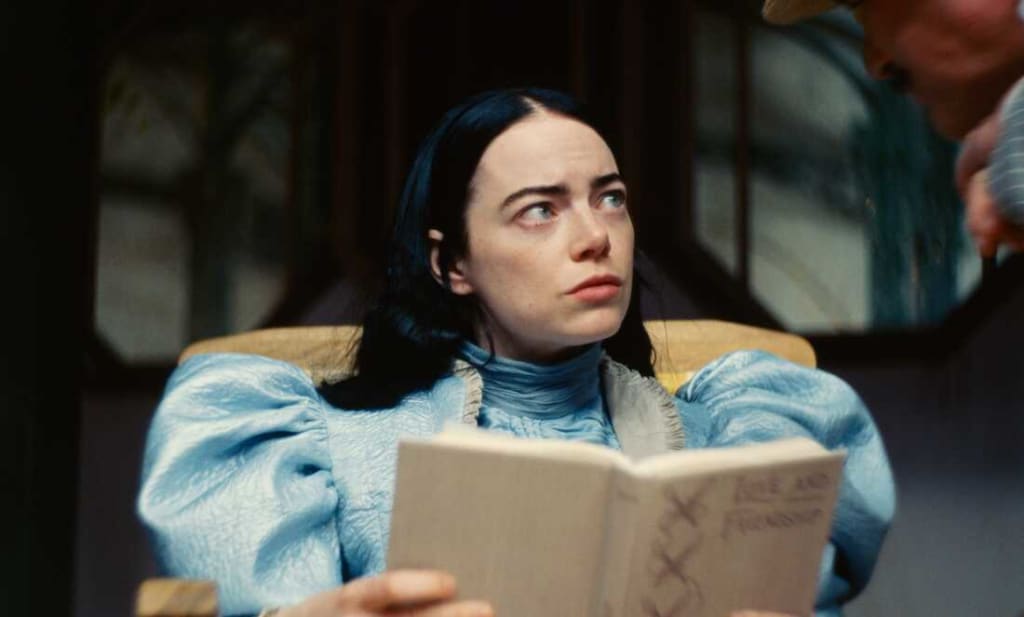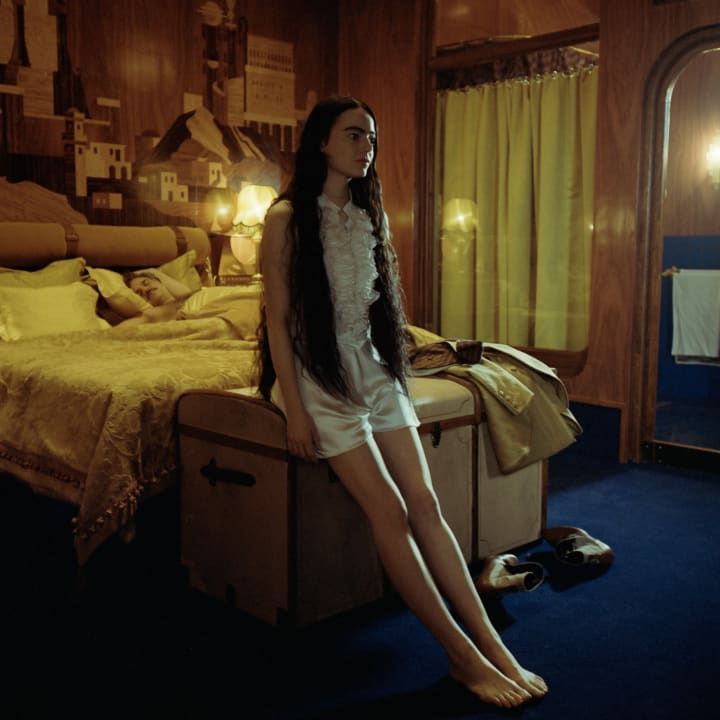
Note: there are a few spoilers here, but I think you should read it and see if you can accept the points I make.
- K.D.
*
Okay, I’m a fan.
I have seen three films by Yorgos Lathimos – “The Lobster”, “The Favourite”, and now, “Poor Things” – and now I have to watch everything in his oeuvre. If “Poor Things” is any indication of where this director is heading, I will be in the theatre watching whatever he chooses to grace the silver screen with, and I will be taking notes. I went to see “Poor Things” the day after Ms. Stone won her second surprise Oscar (only a surprise for her), and I felt as though the entire audience gained a real lesson on how a film can create an atmosphere and take you on a trip that does not involve gauntlets, spaceships, and comic book heroes. This is a real story based on a fantasy that we should all watch.
From the beginning of the film, we are introduced to iris-shots, fish-eye lenses, black and white shifting to colour (transitions that made sense for the plot), and a unique perspective on the Frankenstein story that no one would suspect. A young girl, Bella Baxter (Emma Stone), resides in the home of a doctor whose name and patronage she enjoys, Dr. Godwin Baxter (Willem Dafoe), the victim of childhood surgeries and experiments perpetrated by his own father (one repeated scene with bubbles will stick in your mind). She is one of his experiments and seems to be totally dependent upon him and his staff, including one young man, Max McCandless (Ramy Youssef) who attends his lectures on anatomy at a college and ends up becoming entangled with her professionally and romantically. I can understand why some have argued that the film might be misogynistic and sexist…but I would also argue that you could only make that argument if you stopped watching after the first thirty minutes (the film is over two hours long). There is a particular factor that shifts the game and makes Bella the powerful woman she becomes and we deserve:
When Bella discovers that she does have sexual desire, the scene is framed like a Brassai print. All grey; all still… She is on a bed, her legs stretched out and it is so subtle and quiet that we are almost unaware of what is happening…for a moment. Soon, she wants to share this discovery with the home, and this leads to the real act of rebellion that gets the movie moving (and I am determined to use the phrases “hairy business” and “furious jumping” in a non-Olympic or general business discussion one day). Even in a private home, she is not able to keep her discovery to herself. A Mr. Wedderburn – Mark Ruffalo in a performance that I never knew he had in him – takes her away from “polite society” (and who is kidnapping who here?). They travel, lose a fortune, discover that the world really is not made for their convenience, with Wedderburn becoming a total wreck. And Bella? Well, she is forced to work in a brothel to get them home (and we soon discover this is not exactly true; money has been sown into her clothes), but it is an option that seems to be a happy choice (as she argues, it does not take her a long time to make a few francs; jokes on us XY chromosome-holders), and she becomes popular (good?) at her job.
Should we argue that she is being exploited, along with all of the other girls? Ms. Stone is rather adolescent-like in this film, so the viewer is put in an uncomfortable position of seeing someone with the mind of child approaching a Lolita-like moment. Should we say that the scene where she is in bed with a fellow black prostitute constitutes more exploitation (of who; which one is the...cunning linguist)? These are difficult questions that no one seems to have a straight answer at the ready. Bella is following Candide’s same rough patch, with a much happier ending despite the discovery of her old life and the near-fatal moment that took it all away from her (it is thankful that she returns to a man who can do brain transplants). She is free…
…To a point.
I wonder about race and Ms. Stone. She portrayed a writer in “The Help”, a film whose central message seems to be that, if you are a black woman in the American south during the fifties and sixties, you just have to wait long enough for a white woman to write about your life so things can change. Then there was “Aloha” where she played a quarter-Hawaiian/Chinese woman (ha, ha), and “La La Land”, the jazz-themed film with two white leads trying to succeed in the performing arts with that specific art form (ah).
Now, none of this is really her fault. It is Hollywood’s fault. I still remember “The Pelican Brief”, a film where a white woman goes to a black man for protection as she is being hunted and threatened, and there is never even a suggestion that they will get over their stressful situation in a physical way. And may I mention that the two leads were Julia Roberts and Denzel Washington? The latter claimed he did not want to kiss her on camera, but I think that there were larger forces at play (you got over that lack of intimacy with that recent “Macbeth”, Mr. Washington). It still makes many people deeply uncomfortable to see the colours mix (Jordan Peele, you are ahead of the curve).

On a cruise ship, Bella meets a couple that she chooses to make her companions, an older woman, Martha (the magnificent Hanna Schygulla) and her friend (partner?) Harry (Jerrod Carmichael). It is clear from their first straightforward conversation that Martha and Harry are not lovers (she admits that she has not had one in a long time – hands come into the conversation). They are just travelling together. They are all on a cruise ship. There are no other relationships suggested for Harry (and no discussion of his sexuality, either). And Bella is getting bored of her Wedderburn.
And nothing happens with Harry.
Seriously? Two people stuck on a ship, one only travelling as a companion and the other discovering and offering herself to anyone who intrigues her? And they do intrigue Bella. However, they have created another “Magical Negro” for this occasion who teaches her lessons…on poverty and economics (this becomes the reason why Bella and Wedderburn become temporarily broke). It would have been better for all involved if Bella’s natural curiosity did not have to follow the old trope of being hands off on the whole world of colours mixing it up on screen. And if you think that this is not a problem, please consider “The Pelican Brief” scenario and think of the last time you saw a black-and-white couple on the screen that were allowed to be sexual on that same screen without being punished for it (Morgan Freeman and…? Anyone?).
So, a near masterpiece that was entertaining, beautiful and challenging. It just needed to go a little further to become something perfect.

*
Thank you for reading!
If you liked this, you can add your Insights, Comment, leave a Heart, Tip, Pledge, or Subscribe. I will appreciate any support you have shown for my work.
You can find more poems, stories, and articles by Kendall Defoe on my Vocal profile. I complain, argue, provoke and create...just like everybody else.
Give it a look...
About the Creator
Kendall Defoe
Teacher, reader, writer, dreamer... I am a college instructor who cannot stop letting his thoughts end up on the page.
And I did this: Buy Me A Coffee... And I did this:
Enjoyed the story? Support the Creator.
Subscribe for free to receive all their stories in your feed. You could also pledge your support or give them a one-off tip, letting them know you appreciate their work.






Comments (6)
Looking forward to seeing it some day. Though I still wish Lily Gladstone had won the Oscar.
I don't follow any particular movie director or producer so I tend to rely on those that do for advice on what to watch. I'll check this out. Now that I'm back, I have a lot of catching up to do.
Thank you for writing the review. I will definitely put this movie on my list to watch ☺️
I first read a review by Kendrick Porter for this movie. It made me wanna watch the movie. Then I read a review by Andrea Corwin. It made to wanna stay away from this movie. Now that I've read yours, I'm conflicted hahahahahaha. Excellent review though!
Kendall, I cut the film off, not because of any misogynistic and sexist bent, but I just found it raunchy. I wrote my criteria for a good movie in one of my older stories: I am a very picky movie goer. My time is far too valuable to spend two plus hours watching something that is of no benefit to me either emotionally or aesthetically. So, I have my personal criteria as to what a good movie is in my books: Number one, the story must have some sort of meaning or at least, make you end up thinking or wondering in some capacity. (Easier said than done) Number two, the characters must be rich. Not in wealth, but have a depth so that you want to know more about them, what made them the way they are so that you become them in some sort of wondrous way or you have at least, been them in your own life story. Number three, the setting and the times of the movie must be totally believable so as you feel the sea breeze, hear the bombings, smell the dirt of the land, and feel either the bondage or freedom from it all. And lastly, Number four, for me is this: the movie must make the point with nuance rather than vulgarity. Nudity and profanity aren't always necessary. If a movie leaves me with my own imagination, it is much better. In fact, if a movie can't fulfill that obligation and insists on thrusting me into only the director's idea/imaginings, then I feel shorted. https://vocal.media/geeks/i-fell-in-love-with-summerland
I have now read two reviews of Poor Things on Local. The first absolutely despised and panned it, and yours is quite the opposite. To help me decide if I want to see this film, I propose a litmus test. It may not make sense to you but if you have seen the movie Perfume, it will help me gage if our taste in films are somewhat in alignment. If you saw Perfume, let me know what you thought of it. If you did not, but saw Nocturnal Animals, then please comment on that instead. Thanks Kendall for the review and for humoring me.